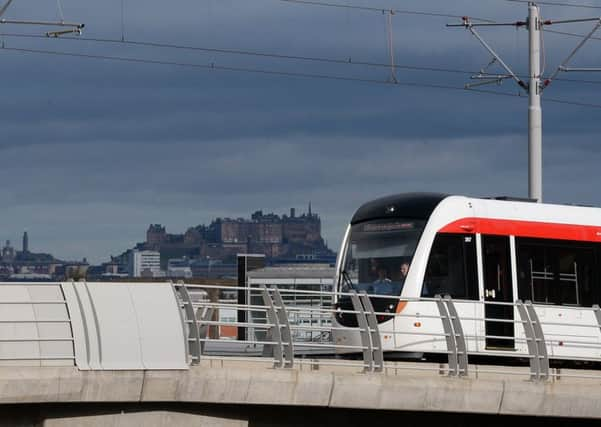Edinburgh tram inquiry: Chief denies figures were manipulated


Stewart McGarrity told the tram inquiry that cost estimates had been professionally arrived at and there was no question of “artificial manipulation” of the numbers. But he later acknowledged some senior figures in TIE enjoyed a bonus scheme which gave them an incentive to keep the cost as low as possible.
Mr McGarrity, who worked for TIE from 2005 until 2010, was asked about a 2007 email in which TIE executive chairman Willie Gallagher made clear his determination to stick to the budget for the project, then £498 million.
Advertisement
Hide AdAdvertisement
Hide AdIn it, he told TIE colleagues: “Let no-one be in any doubt, we will be going back with a number of £498m - get cracking on whatever needs to be done.” Mr McGarrity said the email had been “a call to arms”.
By April 2008 the budget had risen to £508m and Mr McGarrity circulated an email saying: “As far as I’m concerned, this is locked and loaded and I am now a snarling dog at Steven’s side [project director Steven Bell] guarding the sanctity of this budget.”
In the run-up to signing the contract, the way of calculating the risk allowance in the budget was changed, reducing the overall cost estimate for the project.
Inquiry counsel Ross McClelland asked: “Is it possible that the reduction in risk allowance was really a response to that overall approach of trying to get the project in under a particular budget level?”
Advertisement
Hide AdAdvertisement
Hide AdMr McGarrity said: “I don’t think Willie Gallagher’s call to arms was anything more than just that. Project estimates were professionally put together at all times and in no instance was there any artificial manipulation of any numbers to achieve that aim.”
He was shown an email from TIE risk manager Mark Hamill in February 2008 which he recommended “manipulating the current information” rather than “go through the hassle” of trying to persuade the council of the benefits of the new methodology.
Mr McGarrity said he did not recall the email. But he insisted: “That would never have happened under my watch or anyone else’s watch so I don’t know why he has suggested it. But it didn’t happen.”
He added: “Six years worth of project that I was involved in, lots of people said inappropriate things at all kinds of times in emails.”
Advertisement
Hide AdAdvertisement
Hide AdIn another email in May 2008 Mr Hamill said he had “pockled” figures in a spreadsheet to make them add up and added, referring to the council, “I doubt they will notice what I have done”.
Mr McGarrity said: “I would not have pockled anything. I think it’s really unfortunate this email. It’s language he is using in an email which should not be used.”
Inquiry chairman Lord Hardie intervened and said: “It’s more than that, it’s suggesting deception.”
Mr McGarrity said: “Yes.”
When he was asked about a £1m increase in the risk allowance ahead of signing the contract, Mr McGarrity said it was “just good luck money”.
Advertisement
Hide AdAdvertisement
Hide Ad“It wasn’t related to any specific new identified risk, just a demonstration of prudence I guess,” he said.
“But that £1m was actually used about a week later to deal with design increases, so it didn’t last long.”
The inquiry was shown a table suggesting some top directors would receive bonuses linked to how low the final price in the contract was - 100 per cent for keeping it down to £490m, 75 per cent if it was £500m but zero if it was £530m.
Mr McGarrity agreed that the lower the project cost the higher the bonus that would be paid.
Advertisement
Hide AdAdvertisement
Hide AdHe said the three TIE officials named - project director Matthew Crosse, commercial director Geoff Gilbert and procurement director Bob Dawson - had all been involved in negotiating the construction contract. And he agreed their bonus scheme incentivised them to report as low a figure for the anticipated cost of the project as they could.
McGarrity said he had not been aware of the arrangement at the time – oversight of the bonus scheme was the responsibility of the executive chairman Willie Gallagher – but had learned of it much later.
He said: “In retrospect I wish we didn’t have these big bonuses at financial close for anyone. Maybe in retrospect paying bonuses when it’s public sector money is maybe just not a place you should go.”
Asked if it was inappropriate to offer incentives based on the forecast outturn cost, he said: “I would never accede to that now.”
Advertisement
Hide AdAdvertisement
Hide AdHe acknowledged he had received a bonus himself, but said he did not recall whether his bonus was linked to the cost.
Lord Hardie said: “Surely the whole point of a bonus is you are aware of what the incentive is and you achieve that?”
Mr McGarrity replied: “I’m sure I did at the time, but I can’t remember now.”